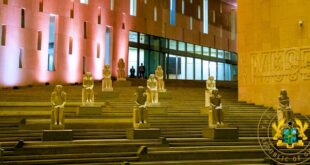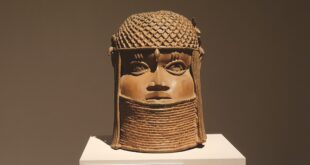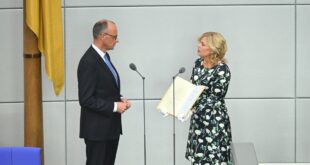Germany and Nigeria have signed an agreement paving way for the return of the more than 1,100 valuable Benin Bronzes in the collections of German museums. These were looted from the Palace of the Oba of Benin some 125 years ago
—-
It was a historic moment on Friday, 1 July when Germany and Nigeria signed the ‘Joint Declaration on the Return of Benin Bronzes and Bilateral Museum Cooperation’ in Berlin, paving way for the return of about 1,130 pieces of artefact held in public museums and institutions in Germany.
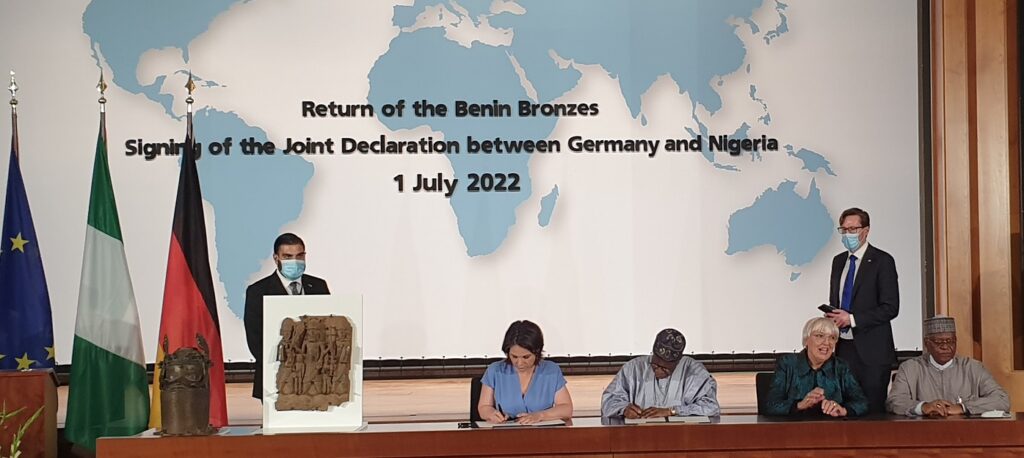
These were part of the more than 5,000 objects, mostly made of brass and ivory, stolen by British soldiers when they attacked and burned down the royal palace of the Benin kingdom in February 1897.
“Reason to celebrate“
The Joint Declaration was signed by Nigeria’s Information and Culture Minister, Alhaji Lai Mohammed, and Minister of State for Foreign Affairs, Ambassador Zubairu Dada, and their German counterparts, Minister for Foreign Affairs, Annalena Baerbock, and Minister of State for Culture and the Media, Claudia Roth.
The event, witnessed by top officials including the Nigerian Ambassador to Germany, Alhaji Yusuf Tuggar, and the Director-General of Nigeria’s National Commission for Museums and Monuments, Prof Abba Tijani, marked a turning point in the efforts of Nigeria to repossess the famous Benin bronze heads and other artefacts that were pillaged from the palace of the Oba of Benin during the infamous punitive expedition of the British Army 125 years ago.
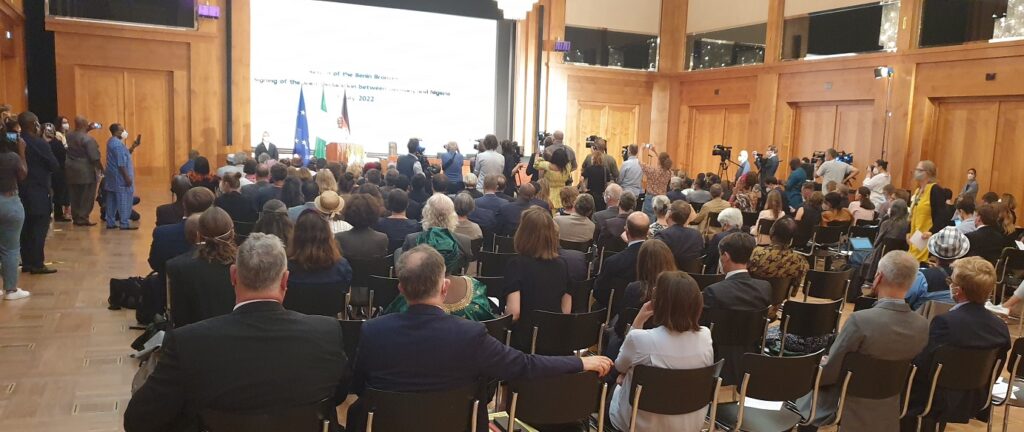
“Today we have a reason to celebrate because we have reached a historic agreement: the Benin bronzes are returning home,” Foreign Minister Baerbock said in her speech.
“It was wrong to take the bronzes and it was wrong to keep them for 120 years. With this in mind, all the relevant actors in Germany – the Federal Government, the states and the museums that own Benin bronzes – have now agreed to return them,” she added to the applause of the audience, comprising members of the diplomatic corps, officials of both the Nigerian and German governments, journalists and members of the Nigerian community in Germany.
“Champion of justice and fairness“
In his remarks at the event, Alhaji Mohammed thanked the government and people of Germany for what he described as the ”single largest repatriation of artefacts anywhere in the world”.
”By this singular action, Germany has taken the lead in correcting the wrongs of the past,” he said.
The minister said Germany did not colonize Nigeria and was not part of the looting of the artefacts, adding that many of the Benin Bronzes in German public institutions got there via trade and donations.
”Yet, Germany and the great people of this nation decided it is better to shape the future by correcting the ills of the past. I have no doubt in my mind that this pace-setting action by the Federal Government of Germany will become a harbinger of more repatriation of cultural property to their place of origin, as other museums and institutions are expected to take a cue from what Germany has done,” he noted, in appreciation of the German gesture.
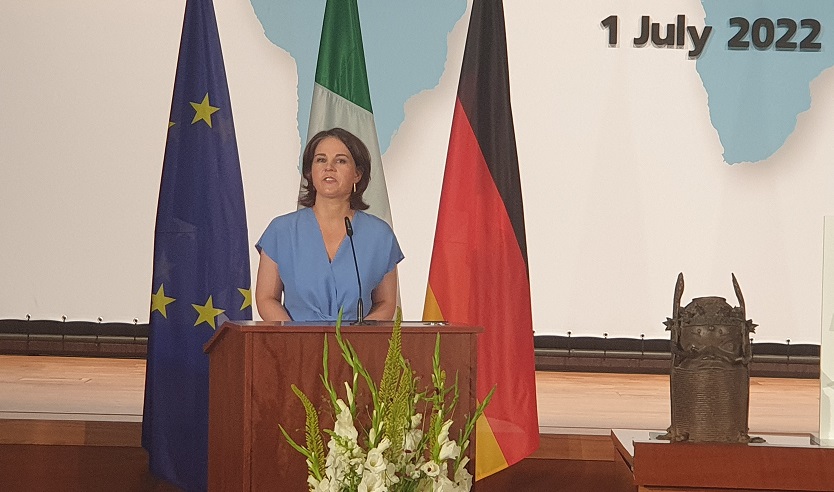
In front of the over 150 guests who attended the function in Germany’s foreign ministry, Minister Claudia Roth affirmed that the restitution of the Benin Bronzes ushered in a new phase of coming to terms with the colonial past.
“As the Federal Government and as a nation, we acknowledge the terrible atrocities of colonialism,” she said.
Ms Roth paid tributes to all those who relentlessly raised their voices for the return of the artefact, including politicians, academics and civil society.
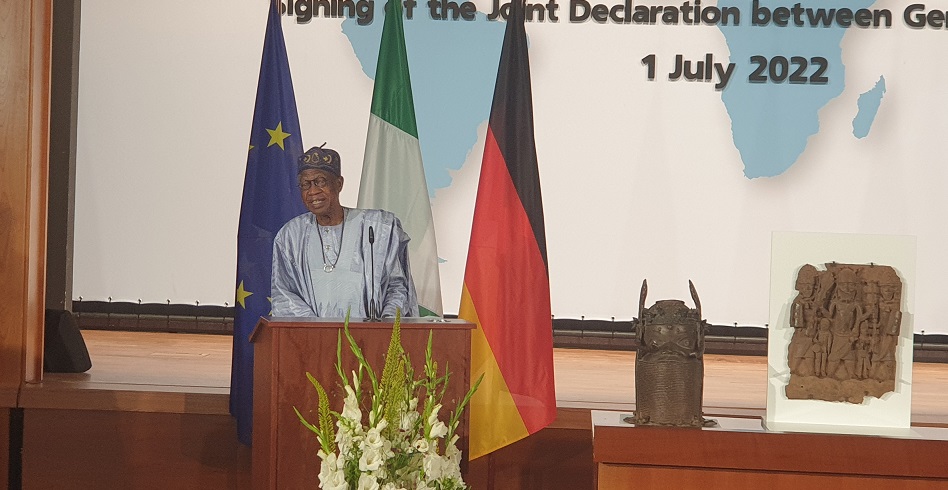
On his part, the Nigeria’s Minister of State for Foreign Affairs, Ambassador Zubairu Dada, called Germany the “champion of justice and fairness” and described the event as ushering in “a new era of cultural diplomacy”. He noted that Germany was the first European country to sign an agreement to return cultural properties that were looted during the colonial occupation of Africa.
Bronze work in the Kingdom of Benin
In a symbolic demonstration of the historic agreement’s implementation, two of the Benin
Bronzes were handed over to Nigeria at the signing ceremony. And their story explains how the artefacts got scattered all over the world.
The bronzes – a sculpture of a king’s head from the 18th century and a relief plate from the 16th century depicting a king with four attendants – were brought to Berlin at the end of the 19th century in the luggage of a German businessman, Eduard Schmidt, and sold to the then Royal Museum of Ethnology in Berlin in 1898.
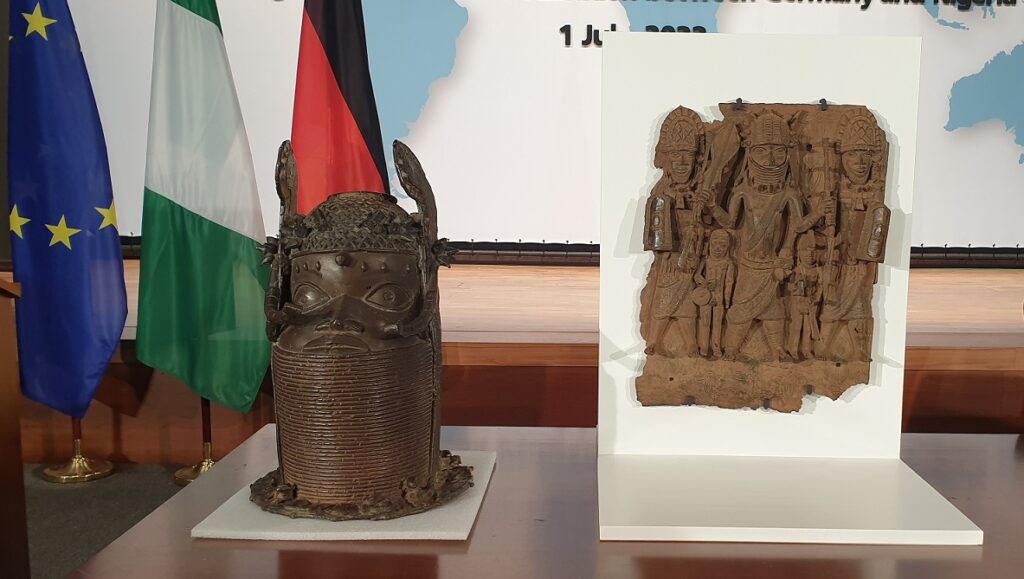
More than one thousand of the Benin bronzes are stored in the depots and collections of a total of 20 museums in Germany. Scholars assume that more than 5,000 bronzes were stolen during the looting of the palace of Oba of Benin in 1897 and their sale helped to finance the British military expedition.
The carefully and artistically crafted bronze work in the Kingdom of Benin was already considered masterful in the 16th century. In addition to their high artistic value, the works of art also have enormous spiritual significance for the Edo people.
Experts from Germany and Nigeria have been working intensively to identify the origin and whereabouts of the bronzes and have been holding talks on the transfer of ownership of the artworks for some time. With the signing of the Joint Declaration, both countries have now prepared a legal basis on which the transfer of ownership of the individual bronzes can be carried out.
Expanding Nigerian-German cultural cooperation
The historic agreement also provides for the expansion of the Nigerian-German museum cooperation. Not all bronzes in the holdings of German museums will return to Nigeria immediately. Nigeria has agreed to lend some of the artworks to Germany so that they can continue to be shown in its museums.
“Both Sides intend that German public museums and institutions will continue to display Benin Bronzes on loan as set out in the transfer agreements,” the agreement says.
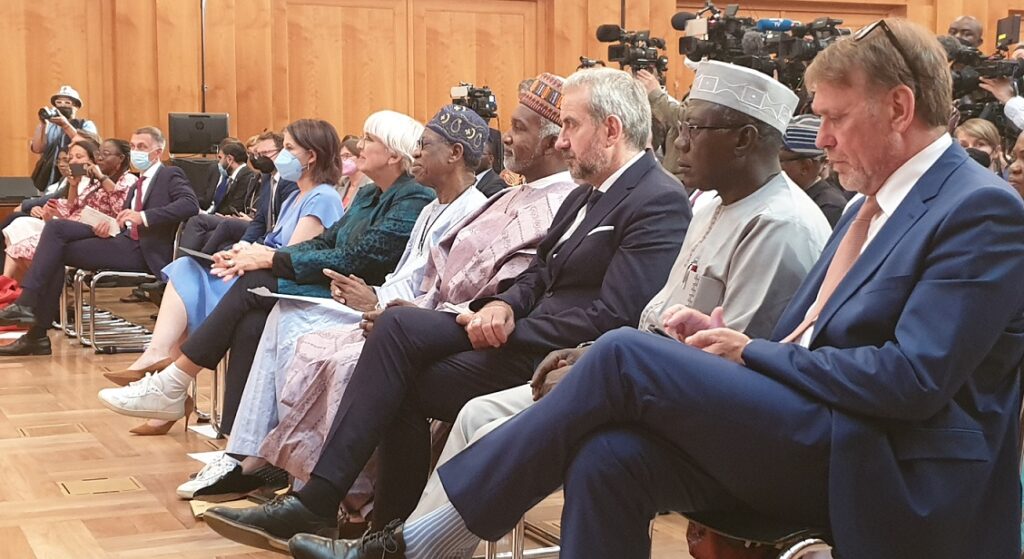
“Both Sides declare their mutual willingness to deepen their cooperation, including archaeological exploration work, training and institution building, in collaboration with the German Archaeological Institute (DAI), joint training of museum managers in cooperation with the planned International Museums Agency and German museums, the German Academic Exchange Service (DAAD) and other partners.”
Germany has pledged to help finance a museum to be built in Benin City to house the repatriated bronzes.
Tributes to Ekpo Eyo
After the signing ceremony, guests moved to the venue of the 2nd Nigeria Cultural Day, where the history-making event was celebrated.
In his welcome remarks, Ambassador Yusuf Tuggar said the signing of the Joint Declaration effectively sealed the return of the Benin Bronzes to Nigeria. He reminded the audience that he had called for the return of the artefacts at the 1st Nigeria Cultural Day in 2019.
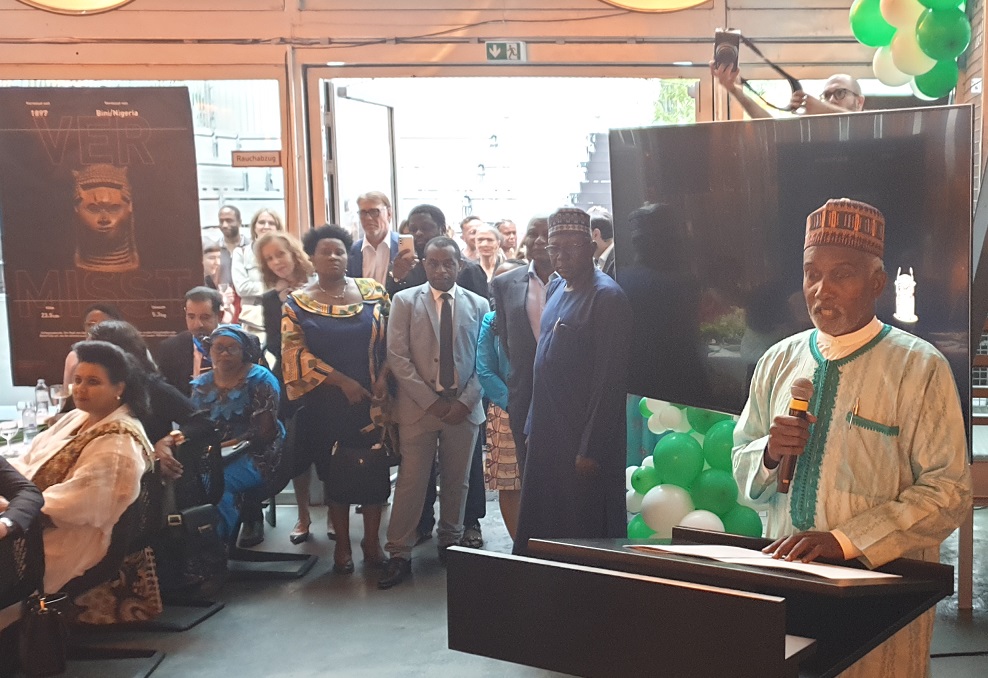
“I am pleased to say that Germany has responded by agreeing to the return of the Benin Bronzes in its public museums and institutions,” he noted. He however said he wasn’t the first Nigerian public official to call for the return of the cultural goods.
“For this reason I would like to pay special tribute on this historic day to Ekpo Eyo, the pioneer director general of Nigeria’s National Commission for Museums and Monuments, who was indefatigable in the struggle for restitution some fifty years ago,” Tuggar said.
“I believe that Ekpo Eyo must beaming down on us today with pride and joy.”
The ambassador also praised Nigerian officials, including Minister Mohammed and Ambassador Dada, for their steadfastness in the pursuit of the cause of restitution, as well as Germans who had been calling for the return of the artefacts long before it even became an international issue.
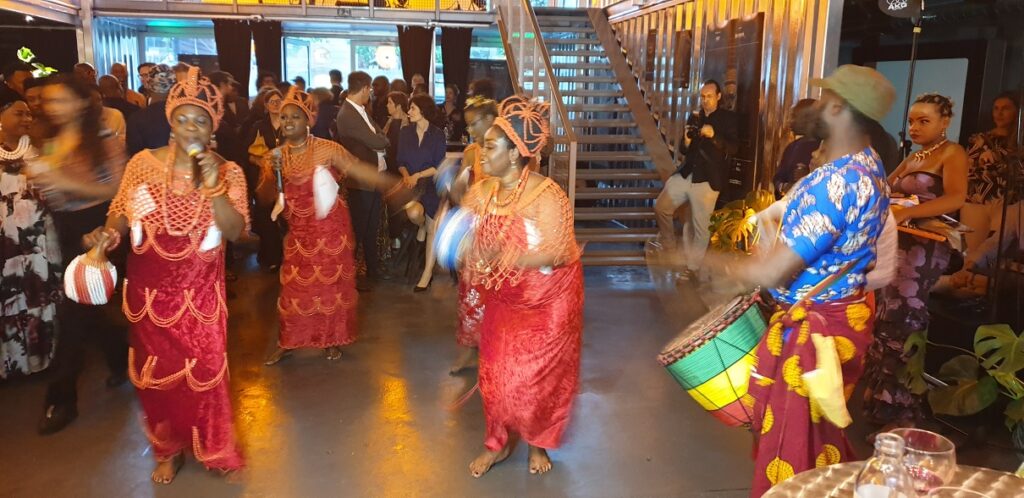
A cake baked for the historic event was cut by Ambassador Tuggar and his wife, supported by the visiting Nigerian ministers.
The event featured cultural performances and plenty of Nigerian music while guests were treated to the finest of Nigerian cuisines.
The 1st Nigeria Cultural Day was celebrated in Berlin on 22 July 2019 and it featured speeches, an art exhibition, a fashion show, a literary fair and plenty of music. Alhaji Tuggar said the Day was initiated to showcase the rich cultural heritage of Nigeria and to expand relations between his country and Germany. The Day could not take place in 2020 and 2021 due to the new coronavirus pandemic.
Femi Awoniyi
READ ALSO Nigeria, Germany to sign agreement for return of Benin bronzes in Berlin
 THE AFRICAN COURIER. Reporting Africa and its Diaspora! The African Courier is an international magazine published in Germany to report on Africa and the Diaspora African experience. The first issue of the bimonthly magazine appeared on the newsstands on 15 February 1998. The African Courier is a communication forum for European-African political, economic and cultural exchanges, and a voice for Africa in Europe.
THE AFRICAN COURIER. Reporting Africa and its Diaspora! The African Courier is an international magazine published in Germany to report on Africa and the Diaspora African experience. The first issue of the bimonthly magazine appeared on the newsstands on 15 February 1998. The African Courier is a communication forum for European-African political, economic and cultural exchanges, and a voice for Africa in Europe.








